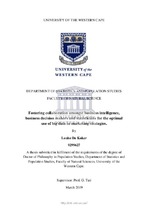| dc.description.abstract | The aim of this study was to propose a model of collaboration adaptable for the optimal use of big data in an organisational environment. There is a paucity of knowledge on such collaboration and the research addressed this gap. More specifically, the research attempted to establish whether leadership, trust and knowledge sharing influence collaboration among the stakeholders identified at large organisations.
The conceptual framework underlying this research was informed by collaboration theory and organisational theory. It was assumed that effective collaboration in the optimal use of big data possibly is associated with leadership, knowledge sharing and trust. These concepts were scientifically hypothesised to determine whether such associations exist within the context of big data.
The study used a mixed methods approach, combining a qualitative with a quantitative study. The qualitative study was in the form of in-depth interviews with senior managers from different business units at a retail organisation in Cape Town. The quantitative study was an online survey conducted with senior marketing personnel at JSE-listed companies from various industries in Cape Town. A triangulation methodology was adopted, with additional in-depth interviews of big data and analytics experts from both South Africa and abroad, to strengthen the research.
The findings of the research indicate the changing role of the statistician in the era of big data and the new discipline of data science. They also confirm the importance of leadership, trust and knowledge sharing in ensuring effective collaboration. Of the three hypotheses tested, two were confirmed. Collaboration has been applied in many areas. Unexpected findings of the research were the role the chief data officer plays in fostering collaboration among stakeholders in the optimal use of big data in marketing strategies, as well as the importance of organisational structure and culture in effective collaboration in the context of big data and data science in large organisations.
The research has contributed to knowledge by extending the theory of collaboration to the domain of big data in the organisational context, with the proposal of an integrated model of collaboration in the context of big data. This model was grounded in the data collected from various sources, establishing the crucial new role of the chief data officer as part of the executive leadership and main facilitator of collaboration in the organisation. Collaboration among the specified stakeholders, led by the chief data officer, occurs both horizontally with peers and vertically with specialists at different levels within the organisation in the proposed model. The application of such a model of collaboration should facilitate the successful outcome of the collaborative efforts in data science in the form of financial benefits to the organisation through the optimal use of big data. | en_US |

